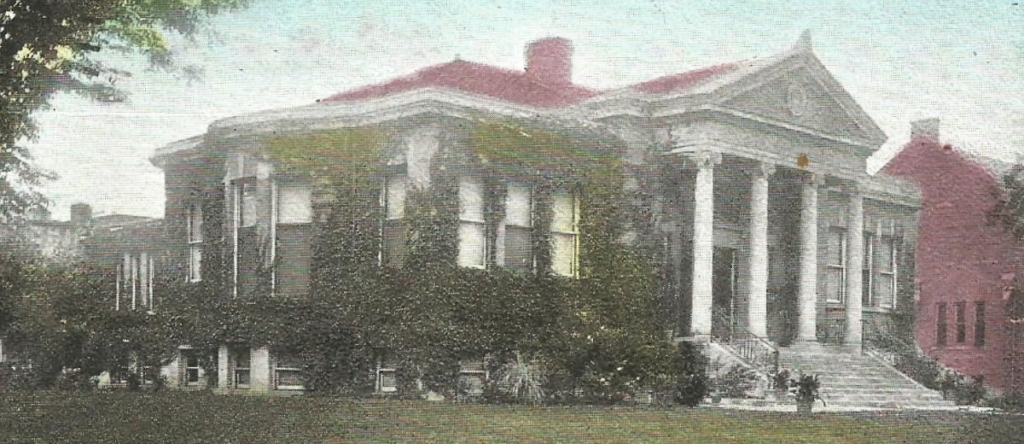
Postcards from the Past ↗
The library has digitized and made available our collection of Lincoln/Logan county postcards in a slideshow for everyone to enjoy.
Genealogical Resources ↗
Local and national resources to help with your genealogy project.
Andrew Carnegie and the Carnegie Libraries
From the late 1800’s to the early 1900’s Andrew Carnegie carved public libraries out of the heart of America and other English speaking nations. His $56 million public legacy includes more than 1,600 Carnegie libraries built in America alone. The first Carnegie Free Library was established in his birth town of Dunfermline, Scotland in 1881.
In all, over 2,500 Carnegie libraries were established. Many of these libraries are designed in a grand architectural style, making them easily identifiable in larger cities and monuments in smaller towns. This perpetual gift to the community was planned as a source of self-education. The only two requirements were that the community provide the building site and support the libraries upkeep, utilities, and books with an annual fund of 10% of the building costs.
Today, many Carnegie libraries are found in small, off-the-beaten-path towns. They often include elaborate stained-glass domes and windows. Historians have noted the contributions of Andrew Carnegie to the American library movement. The importance to the communities receiving Carnegie assistance heeds continued attention.
The Lincoln Carnegie Library
In 1901 the City of Lincoln received the grant for a new library. Combined with the donation by will of a home and two lots by Isabel Nash and gifts by Stephen Foley, the City and Lincoln Public Library constructed a “classic” , style library structure designed by W. A. Otis, of Chicago, in Lincoln, IL. Other than maintenance and alterations not affecting the structure’s character, the only significant change has been the remodeling and opening of the basement during 1972-1974.
Lincoln Public Library’s history typifies the combination of national wealth, grass roots initiative, and cultural ideals which generated the free library movement and its goal of a free and educated American society. The Lincoln Public Library was listed on the National Register of Historic Places in 1980.
Historical Highlights
| 1874 | April 18 | Meeting In Cumberland Presbyterian church. First resolution adopted to form an association to be known as the Lincoln Library Association. Colonel Robert B. Latham chosen as chairman. |
| 1874 | April 20 | Fourteen ladies of the city were asked to solicit funds for the Library Association at $10.00 a share. |
| 1874 | April 28 | 144 shares were sold netting $1,440. |
| 1874 | May 14 | First regular meeting as the Lincoln Library Association. |
| 1874 | August 13 | Albert B. Jones elected librarian at the sum of $150.00 annually. |
| 1874 | August 29 | Library was opened to the public at 2 p.m. in a building on Kickapoo Street. |
| 1879 | March 20 | Library Association rented a room in the Universalist Church (later known as Business College). |
| 1881 | April 28 | Suggested Lincoln Library Association might be combined with Lincoln University Library. |
| 1895 | April | Lincoln Library Association presented to the city of Lincoln all property owned by the association and about 3,000 volumes. A room would be provided for the library in the City Hall, soon to be erected. |
| 1897 | Bequest of 2 lots from the will of Miss Isabel Nash, former librarian, to be used for library purposes. | |
| 1899 | Bequest of Mrs. Louise Scully of $2,000, the interest of the fund to be used for purchase of books. | |
| 1901 | Ordinance by the Lincoln City Council providing annual appropriations of $2,500 for the support of the library to be known as the library fund. $25,000 gift of Andrew Carnegie, philanthropist, for the erection of a public library. | |
| 1902 | $5,000 gift of Judge Stephen A. Foley to make possible building of library, estimated at $30,000. | |
| 1903 | April 29 | Dedication of new library; program held at Cumberland Presbyterian Church. |
| 1920 | Library provided materials for public schools in Lincoln. | |
| 1922 | New system of book cards to facilitate circulation of books. | |
| 1950 | Miss Ida Webster resigned after 55 years of service as librarian. | |
| 1957 | Mr. David Harts, president of the Board of Directors, resigned after serving 52 years. | |
| 1961 | September | Lincoln rewspapers, filed in the library, were microfilmed by the Illinois State Historical Library |
| 1965 | Mrs. 0. F. Kresse, librarian, suggested plan of Children’s Library in lower level. | |
| 1969 | Joined Rolling Prairie Library System in Decatur, Illinois, for additional library advantages to the community. | |
| 1974 | April 21 | Dedication of Children’s Library and Community Room in lower level. |
| 1974 | Sept 22 | Centennial Celebration of library’s 100 years of service to the community. |
| 1995 | March | Opened the new Annex across the alley from the Carnegie building. |
| 2003 | April | Centennial Celebration of the Carnegie building. |
External Links
• Finding Lincoln, Illinois Site![]()
• Lincoln Daily News story on the History of the Library.